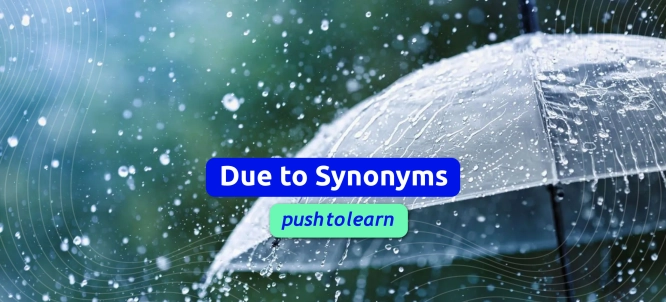by PushtoLearn
Due to Synonyms
Table of Contents
Due to Synonyms Exercises
These exercises focus on Due to Synonyms
What Does Due to Mean?
"Due to" is a phrase that explains the cause or reason for something. For example:
-
The game was canceled due to heavy rain.
(The rain caused the cancellation.)

Vocabulary List for Synonyms of Due to
-
Because of (preposition)
-
Definition: On account of; as a result of.
-
Example: The event was postponed because of the bad weather.
-
Explanation: This synonym is widely used in both formal and informal contexts and is a simple alternative to "due to."
-
Owing to (preposition)
-
Definition: Because of; as a result of.
-
Example: The flight was delayed owing to technical issues.
-
Explanation: Commonly used in formal or semi-formal contexts, this phrase is interchangeable with "due to" in most cases.
-
As a result of (phrase)
-
Definition: Because of something; caused by.
-
Example: Traffic was heavy as a result of an earlier accident.
-
Explanation: This phrase is useful when emphasizing the consequence of a cause.
-
On account of (phrase)
-
Definition: Because of; for the reason of.
-
Example: The school was closed on account of a severe snowstorm.
-
Explanation: Slightly more formal than "because of," this synonym is well-suited for written communication.
-
By reason of (phrase)
-
Definition: On the grounds of; because of.
-
Example: His resignation was by reason of health concerns.
-
Explanation: This phrase is highly formal and typically found in legal or official documents.
-
Thanks to (preposition)
-
Definition: Due to the help of someone or something; as a result of.
-
Example: Thanks to her hard work, the project was a success.
-
Explanation: This phrase often carries a positive connotation and highlights credit or gratitude.
Rules for Using Synonyms of Due to
-
Placement in a Sentence
-
"Due to" and its synonyms are often followed by a noun or noun phrase, not a full sentence.
Example: -
Correct: The meeting was canceled due to bad traffic.
-
Incorrect: The meeting was canceled due to the traffic was bad.
-
Formal vs. Informal Usage
-
"Because of" is more neutral and common in everyday English.
-
"Owing to" and "on account of" are more formal.
-
"Thanks to" is informal and typically expresses gratitude.
Summary Table
|
Word/Phrase |
Definition |
Example Sentence |
|
Because of |
As a result of |
The event was postponed because of the rain. |
|
Owing to |
As a result of |
The flight was delayed owing to bad weather. |
|
As a result of |
Caused by |
Traffic was heavy as a result of the accident. |
|
On account of |
For the reason of |
The school closed on account of the storm. |
|
By reason of |
On the grounds of |
He left by reason of health issues. |
|
Thanks to |
As a result of (with positive connotation) |
Thanks to her effort, we won the award. |
Common Errors When Using Synonyms of Due to
-
Mixing Clauses Incorrectly
Incorrect: He was late because of he missed the bus.
Correct: He was late because of missing the bus. -
Overusing Formal Synonyms
Some learners use "owing to" in casual conversations, which may sound overly formal. Instead, use "because of" for everyday situations. -
Confusing Positive and Negative Causes
-
Use "thanks to" for positive situations.
Example: She got the job thanks to her hard work. -
Avoid using it for negative causes. Instead, use "because of" or "due to."
Everyday Use of Due to and Synonyms
Here are some sentences you can use in daily life:
-
Because of: I didn’t go to the park because of the rain.
-
Owing to: The match was postponed owing to technical issues.
-
Thanks to: I passed the exam thanks to your support.
-
On account of: She left early on account of feeling sick.
-
As a result of: As a result of the traffic jam, we missed the event.
FAQ
What is the difference between "due to" and "because of"?
"Due to" is often used after a form of the verb "to be" (e.g., "The delay was due to traffic"), whereas "because of" can be used more flexibly (e.g., "The event was postponed because of rain").
When should I use "owing to"?
"Owing to" is ideal for formal or semi-formal contexts, such as professional reports or academic writing, but it can also replace "due to" in most sentences.
Is "thanks to" always positive?
While "thanks to" typically carries a positive connotation, it can also be used sarcastically to highlight a negative outcome (e.g., "Thanks to his mistake, we missed the deadline").
Which synonym is best for legal or official contexts?
"By reason of" is highly formal and most appropriate for legal or official documents, as it emphasizes a clear, justified cause.
What is a casual synonym for "due to"?
"Because of" is the most casual and widely used synonym for "due to."

